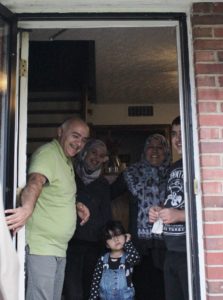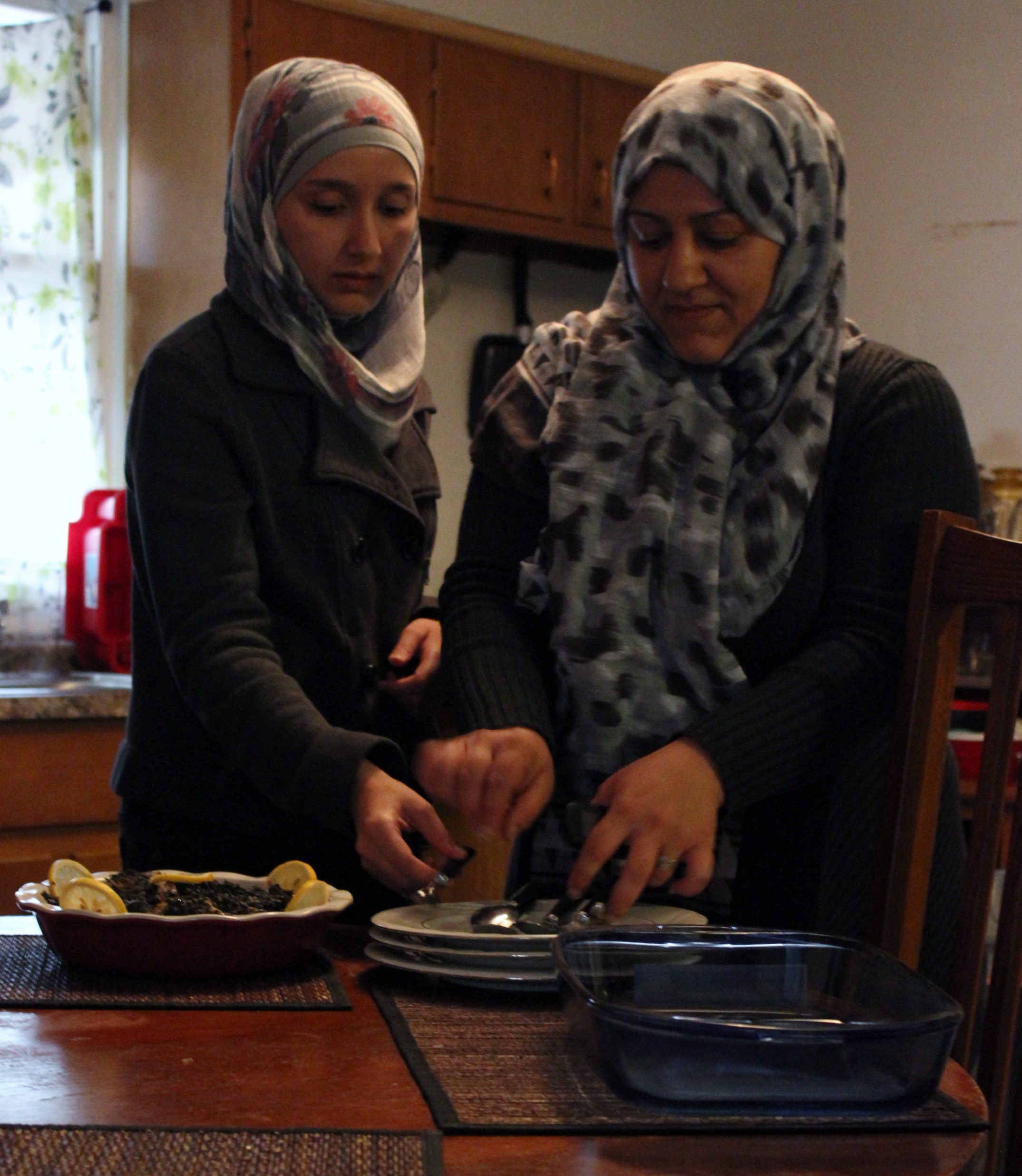For Abdullatif Dalati, hospitality runs in the family. When he was a child, his father owned a restaurant in Syria, their home country. Abdullatif later took over ownership, growing to own four restaurants in Aleppo and Alrka. “The Syrian kitchen is famous all over the world!” he says through an interpreter.In 2014, Abdullatif, his wife Fatima, and their family of six children fled Syria for Turkey. They applied for refugee status with the UNHCR and requested resettlement through the U.S. State Department. Kentucky Refugee Ministries welcomed them to Louisville in July of this year.
In 2014, Abdullatif, his wife Fatima, and their family of six children fled Syria for Turkey. They applied for refugee status with the UNHCR and requested resettlement through the U.S. State Department. Kentucky Refugee Ministries welcomed them to Louisville in July of this year.

Abdullatif Dalati and his family are originally from Syria. In their new Louisville community, they share their traditional Syrian cuisine.
“We were very famous there,” says his wife Fatima. The restaurant’s most popular dish was minced meat called a kebob, although not like the commonly-known shish kebobs in the U.S., they explain. When translated from the Arabic word, the name of their main restaurant in Aleppo means “the wind when it goes over the sea,” Abdullatif says, making a whoosh sound.
In their kitchen in Kentucky, his children find pictures on their cell phones of family meals their father and mother have made since resettling in a new home. A traditional Syrian breakfast, they say. A meal of with bulgur, minced meat, and spices, says another. “There are more than six different kinds of preparation for this,” Abdullatif says. “Oh, and the stuffed chicken!” he exclaims, smiling and closing his eyes. “These foods– they remind me of my homeland.”
To find the ingredients they need for their traditional Syrian recipes, the family sometimes has to visit multiple grocery stores. Their home is full of kitchenware, partly due to the support of the Muslim Community Center, who created a co-sponsorship team to collaborate with Kentucky Refugee Ministries in welcoming the family. Before the Dalatis arrived, the team gathered furnishings and household items for the family’s rental house. “We did buy a lot more kitchen items!” Fatima says, gesturing to utensils and appliances.
Their oldest daughters Malak and Nour are learning from their parents. Abdullatif adds that their son Abdulrazzak serves as the family’s judge: “He has a good taste in food! He can tell what is good, what is bad.”
People are encouraging Abdullatif to open a Syrian restaurant in Louisville one day, he says. “This is one of my goals,” he says, “I need to be financially stable first.” This fall, he began his first job in the U.S., working full-time at Ingram Micro, an electronics company. His third shift hours allow him to help his family of eight, he says.
Already, Abdullatif is cooking for different crowds, inviting new friends to his home to share a meal. He cooked for over 30 at a Syrian community gathering and at another event at the Westport Road Islamic Center, he barbecued. “Eastern food, Western food… I can prepare this!” he says. “It is a victory for me,” Abdullatif adds, “seeing how happy people are with the food.”
[Top photo: Nour and Fatima, daughter and mother, prepare dinner for the family of eight.]Lentil Soup with Lemon Zest and Garlic: a recipe from Abdullatif Dalati
2 tablespoons grated zest and 2 tablespoons juice from 1 to 2 lemons
1/2 cup chopped fresh parsley leaves
6 medium cloves garlic, minced (about 2 tablespoons)
1/2 cup extra-virgin olive oil, divided
Kosher salt and freshly ground black pepper
1 large leek, white and pale green parts only, finely chopped (about 1 cup)
1 medium onion, finely diced (about 1 cup)
1 large carrot, peeled finely diced (about 1 cup)
2 stalks celery, finely diced (about 1 cup)
1 pound dried brown or Puy lentils
2 bay leaves
2 quarts homemade or store-bought low-sodium broth
Combine lemon zest, parsley, garlic, and half of olive oil in a medium bowl and stir with a fork until homogenous. Season to taste with salt and pepper and set aside. Heat remaining olive oil in a large Dutch oven over medium-high heat until shimmering. Add leek, onion, carrot, and celery and cook, stirring frequently, until softened but not browned, about 5 minutes. Add half of parsley-lemon mixture and cook, stirring, until fragrant, about 1 minute. Add lentils and stir until coated in oil. Add bay leaves and stock. Bring to a boil, reduce to a bare simmer, cover with lid slightly cracked, and cook until lentils are completely tender and falling apart, about 1 hour, adding water as necessary (lentils should be fully covered at all times). Using a hand blender, blend soup until as smooth as desired. Alternatively, transfer half of soup to a standing blender, blend until smooth, and fold back into remaining soup. Whisk in lemon juice and season to taste with salt and pepper. Serve, drizzling extra lemon-parsley mixture on top of each serving. Soup can be stored in the refrigerator for up to 5 days.

You must be logged in to post a comment.